Lebanon is such a confusing country. It is full of contrasts everywhere you look and with each person you talk to. Just when you think you understand it, you realize you don’t. I think only people who are native to here can begin to understand it. Living in Lebanon means living in uncertainty. It’s an exhausting way to live, but they do just that…they live and they don’t really think about or notice these contrasts. But outsiders do notice these contrasts; so be prepared for them.
Table of Contents
Snow | Sand
The contrasts begin with something the Lebanese are very proud of; they boast about one of their most popular contrasts – the climate. I’ve had numerous people tell me how Lebanon is the only country where you can go skiing in the morning and go to the beach in the afternoon. Yes, there are mountains here. And yes, you can ski on them. It is a pretty amazing fact – especially coming from America where our mountains, sea, and climates are divided by great distances. But this contrast is just the beginning.
Safe | Dangerous
Read the State Department warning and 80% of the people wouldn’t go to Lebanon. However, locals say it’s normal; come and it will be fine. I think they are so used to living in uncertainty that the uncertainty has become certain to them and they don’t even know it any longer. Numerous times I received mixed messages while I was in Beirut. In case you didn’t know, the US Government considers one of the major political parties in Lebanon, Hezbollah, to be a terrorist group.
Locals were repeatedly told not to wander in certain Hezbollah areas. I’d ask “Why?”, trying to better understand what the repercussions of walking in a Hezbollah neighborhood were. Sometimes people would tell me I would be kidnapped. Some people said I would be followed. Everyone told me not to take any pictures or even get out my camera in a Hezbollah neighborhood. And then some people told me I’d be fine (as long as I didn’t have my camera out!). I was totally confused. I had never heard any news of random tourists getting kidnapped in Lebanon lately…but who knows?
On top of it, I didn’t even know where the Hezbollah areas were – it’s not like they were outlined on a map like we outline red and blue states in America. When I asked people, generally I was told I would just be able to ‘feel’ it…they were different and I would notice that instinctively. I don’t think they were taking into account that I’m a foreigner and everything is different to me no matter where I’m in Lebanon! I finally did get people to show me some general areas on the map, but quite frankly – I never really was very sure.
Dollar | Lyra
Go to an ATM in Lebanon and strangely you’ll get a choice of receiving your money in Lyra or US Dollars. For all purposes, the Lyra is a dead currency; it died after years of war and inflation. However, it’s still around. 1500 Lyra = 1 US Dollar – this is a very important thing to know because throughout Lebanon you’ll be able to pay in dollars or Lyra interchangeably – even within the same transaction. You never know what currency you will get back either – or it may be a mix of currencies. This means tourists must be math geniuses.
I’m used to converting money all the time when I travel, but I’m not used to converting it multiple times in different currencies in the same transaction. The locals are great at this though since they’ve been living with this forever and the exchange rate hasn’t changed for decades. Sometimes you’ll even negotiate taxi fares in Lyra and then pay in dollars, and then get Lyra back as change. Of course, I wonder if this isn’t just a ploy to rip you off, but I never did get ripped off; it’s just normal everyday stuff for the Lebanese.
Modern | Old
Walk around Beirut and you see bombed-out buildings, and bullet holes on the sides of buildings, right alongside shiny new, modern malls and high-rise condos. This is one of the most confusing things about the city – this mix of new and old. But not just old… war-ravaged old. Buildings crumbling with people still living in them. Some had massive holes in the sides of buildings from bombs, bullet holes peppering the upper floors, and completely abandoned buildings left as skeletons.
Learn about Hookah culture in Lebanon
Fifteen years of civil war left most of Beirut flattened into rubble. Most cities would have given up and moved on to rebuilding somewhere else; however, Beirut has been rebuilding its downtown area and refurbishing these buildings. Seeing this contrast was probably the most shocking thing to me. I had never been in a country with such a recent and prolonged violent history before so each bullet hole stuck out to me like a scar, while the locals barely noticed them.
Middle East | Europe
Lebanon is considered the Middle East, however, it doesn’t feel like the Middle East at all. Beginning with the fact that three languages are spoken interchangeably within the same sentence! French, Arabic, and English are intermixed effortlessly in conversation. The common greeting is “Hi, Kifak, Ca va?” English, Arabic, and French meaning “Hi, how are you doing?” You will also commonly hear this – “Okay merci kteer”, “yallah bye!”; translation: “Okay thank you very much”, “Come on, bye”, Not only is the language mixed, the religions are mixed too.
This gets very complex, however, the first thing you’ll probably notice as a tourist is that you will see women in burkas (veil) and hijabs (a scarf covering the hair) walking next to a woman with a mini skirt and 4-inch stilettos. Tight clothes, no problem, cleavage – no problem. Anything goes in Beirut when it comes to fashion – you will see the two extremes. The beauty is – no one cares. You get no strange looks, no one judging you; they just accept the diversity.
Developed | Unstable
Upon arriving in Lebanon and meeting my host family, at 6 PM the electricity went out; I sat in complete darkness a little stunned. I’m used to power outages in many countries, but I wasn’t expecting it here in such a modern country. After about 10 to 15 seconds all of the power came back up…thanks to a huge neighborhood generator. The city of Beirut has daily power outages, but they are so common that every neighborhood has generators that pick up the slack.
This means all of the residents pay two electric bills; one to the Libon Electric, and one to whomever owns the generator. They decide how much electricity they want to buy from the generator and most people have chosen to use less overall energy while on the generator. This basically means that before you use the microwave, you better first check and see if you are running on the generator or if the electricity is on else you may get charged more. As a foreigner, I would forget this strange fact of living, but to the locals, this was second nature.
These contrasts kept me intrigued and curious the whole month I was in Lebanon. It’s like no other country I’ve been in; instead, it’s like all of the countries I’ve been in before around the world – shoved into one small little country.
Have you been to Lebanon? What are the contrasts you experienced?



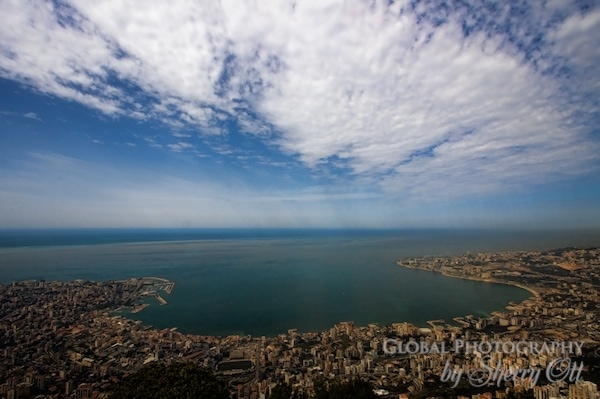

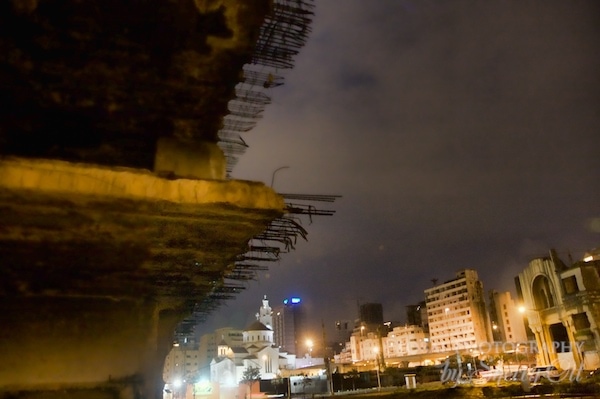
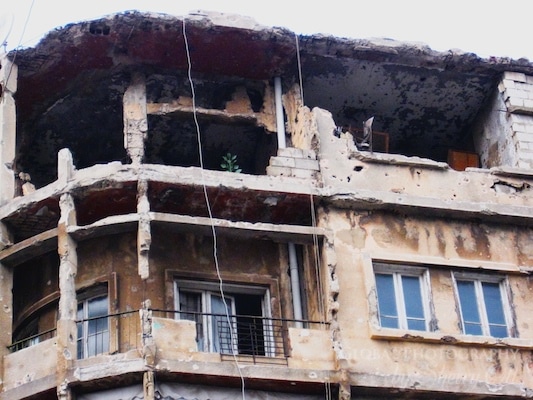
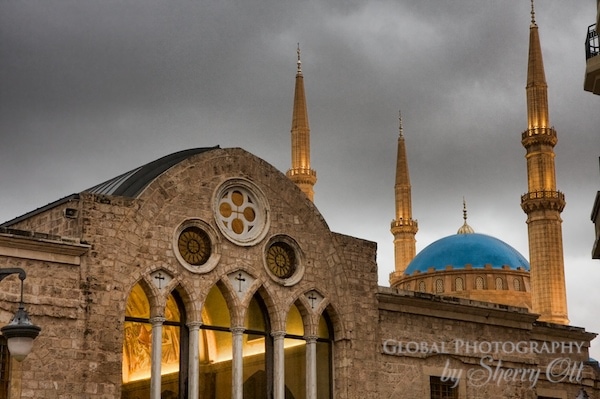

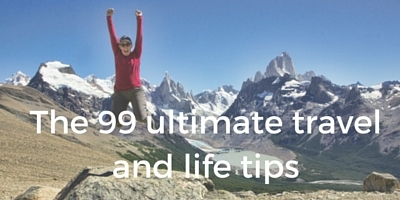
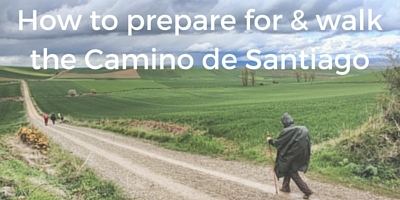
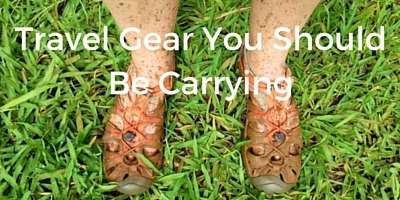
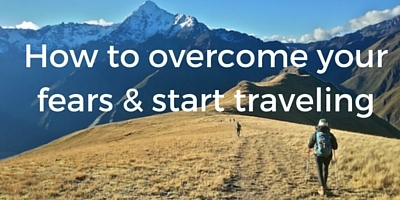

By Wandering Trader March 3, 2011 - 4:48 am
I haven’t been to Lebanon yet but reading through your blog definitely made me feel the confusion that you felt. Were you overpowered by frustration during any point of the trip though?
By Sherry March 3, 2011 - 5:03 am
Yes – I was definitely frustrated at times – but most often I was in awe of how the locals adapted to all of this contrast and uncertainty. I’ll have some more posts coming up about the war culture – which was REALLY fascinating to me. I would get home at the end of the day and my head would hurt just from thinking too hard! People love to talk there and get into deep conversations about politics…so it was fascinating.
By Wandering Trader March 3, 2011 - 5:58 pm
I certainly admire your fascination for the Lebanese 🙂 It must have been an eye-opening experience for you. Looking forward to your new posts!
By Abi March 4, 2011 - 5:53 am
A very interesting summary, Sherry, thanks. Your point about “living in uncertainty” reminds me of two Israelis I met while travelling who lived near the Gaza strip. They were complaining about how outside media portrays the region as more dangerous than it is and then said that you only hear the bombs falling at night every now and again. I suppose that people living in uncertain situations must grow used to that uncertainty. But you’re right – outsiders notice!
By Sherry March 4, 2011 - 11:44 pm
It’s so deeply woven into their culture they don’t even notice any longer. That’s why I enjoyed visiting Lebanon – it really was fun to look at it with fresh eyes. I have lots more coming up on the site about the culture of the war. Stay tuned!
By Theodora March 6, 2011 - 7:30 am
After Tehran fell, Beirut was always known as the most cosmopolitan country in the Middle East. It’s good to know that that still continues.
By Vítor March 7, 2011 - 7:24 am
Hi Sherry, I’ve been to Lebanon on last October and it was an amazing experience. I noticed the same contrasts as you.
I liked the example of religious tolerance that is seen on the streets: Christians and Muslims side by side.
I felt safe on the streets, people were very nice, even when I was wandering at night.
I would return there in coming years.
By Rebecca March 13, 2011 - 1:42 am
Certainly a land of contrasts but it sounds fascinating and I’d love to go there!
By Sherry March 13, 2011 - 10:54 pm
It really was a great month in Lebanon. Stay tuned as I have lots more writing to do about it!
By Anonu May 10, 2011 - 10:00 am
I am Lebanese and have lived there for approx half my life. It is interesting/funny to read an outsiders remarks. Indeed, many Lebanese pride themselves on the “contrasts” – but they almost come as second nature as you mention. When the electricity goes out in the US, panic reigns – but this is perfectly normal (unfortunately) in most parts of Lebanon. I do disagree with you on the Lebanese Pound being a dead currency. It is pegged to the dollar – yes. Some institutions do not accept US dollars + you can also get a very high rate of return (8%+) with some Lebanese Pound-denominated savings accounts… So definitely not “dead”.
By Hiba jaber September 29, 2011 - 11:27 am
Hey guys…..i’m a lebanese girl and believe me when i say that how matter small lebanon is or how matter there are problems in it, when it comes to life……lebanon rocks!… Well, yeah ok it’s a mix of everything….but that what makes lebanon so special my freinds!….we know english,we know french we know arabic and we even know spanish, some of us know russian , italian,brazilian,and a lot more …..we think it’s great to know defferent languages….i’m only 14 and believe me that i know how to talk a lot more then you all do …..you know why?….cuz lebanon is a combination of everything great in the world….we have took the specialties of every single countrie and use it ….. You think that we don’t have tecnologie!?….well,in fact,we don’t have a lot….but it’s not our problem if we have been in a war a lot,we have been killed a lot , we have been treated like shit a lot ….and you are still saying that we don’t know how to improve our self?!….no!…we know but we can’t , we didn’t have a chance….what? Did you think that lebanese peopole are millionaires….well,gess what…we are not, we are who we are, we are self educated, we understand everything and everyone….yes we do….. What i want to say is that if you are planing to travel and see the world….just travel to lebanon , you will see,hear,feel ,enjoy,eat,everything here…….”viva lebanon! il est the best!”
By Tori December 9, 2019 - 3:46 am
I love to read your blog. I was impressed by the photos. Very interesting review. Thanks!
By Steven July 11, 2022 - 8:26 am
Although it sounds incredibly interesting and is definitely a land of different beautiful places, I would love to visit there!